
MBTAAnalysis: A look inside the MBTA
0 Comments
/
The MBTA shuttles over a million passengers a day around Greater…
 https://pioneerinstitute.org/wp-content/uploads/CloseupClock-1.jpg
739
1244
Mary Connaughton
https://pioneerinstitute.org/wp-content/uploads/logo_440x96.png
Mary Connaughton2017-02-20 12:34:192017-02-21 09:47:58The Clock is Ticking…….
https://pioneerinstitute.org/wp-content/uploads/CloseupClock-1.jpg
739
1244
Mary Connaughton
https://pioneerinstitute.org/wp-content/uploads/logo_440x96.png
Mary Connaughton2017-02-20 12:34:192017-02-21 09:47:58The Clock is Ticking…….
Frontier Institute’s Trish Schreiber on School Choice & Charter Schools in Montana
In this episode of The Learning Curve, co-hosts U-Arkansas Prof. Albert Cheng and Alisha Searcy interview Trish Schreiber, senior fellow in education at the Frontier Institute in Montana. Schreiber shares her journey from Silicon Valley to Montana and her passion for expanding educational opportunities.
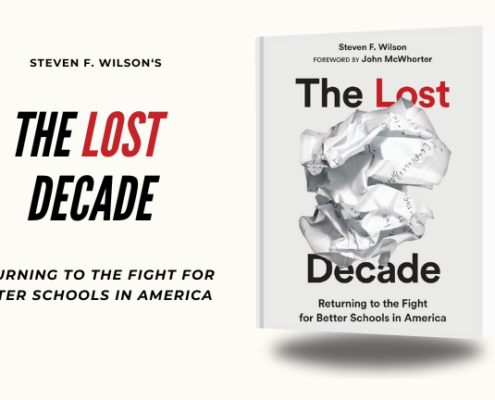
The Lost Decade Calls for Replacing “Social Justice Education” with Education Rich in Liberal Arts, includes a foreword by John McWhorter
Book finds that marginalized students suffer most from turn away from academics
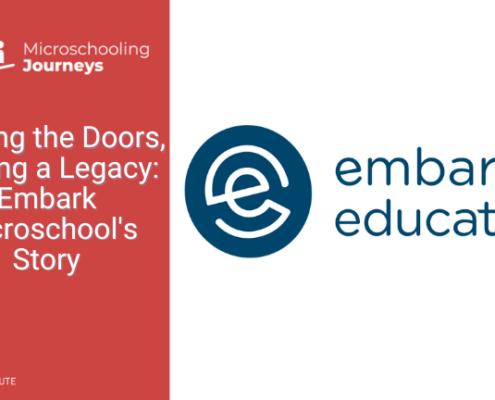
Closing the Doors, Leaving a Legacy: Embark Microschool’s Story
Microschools launch and close more easily than traditional schools—is that a feature or a bug? This week on Microschooling Journeys, Brian Hyosaka shares the story of Embark Micro Middle School in Denver, a tuition-free, philanthropy-backed microschool closing after six successful years. Rather than charge tuition or become a charter, they chose to "go out on top." Embark’s legacy includes inspiring hundreds of educators. Folks, this is where we leave our limited podcast series. Microschooling Journeys has come to an end, if you listened, thank you, please give me a shout, I’d love your feedback. This is Curious Mike signing off!

UK Oxford’s Robin Lane Fox on Homer & The Iliad
In this week’s episode of The Learning Curve, co-hosts Alisha Searcy and Dr. Helen Baxendale interview Robin Lane Fox, distinguished classicist and Emeritus Fellow at Oxford. Prof. Lane Fox offers profound insights into Homer’s Iliad and its enduring significance. He explores the epic’s historical and literary context, from its roots in oral tradition to its lasting influence on Western culture.

Director/Actor Samuel Lee Fudge on Marcus Garvey & Pan-Africanism
https://dts.podtrac.com/redirect.mp3/media.blubrry.com/3809857/api.spreaker.com/download/episode/64587551/thelearningcurve_samuelleefudge.mp3
In…

Wildflower’s 70+ Microschools, Eight Years Later: Did Matt’s Vision Become Reality?
This week on Microschool Journeys, Curious Mike sat down with Matt Kramer, founder and CEO of Wildflower Schools, a national network of teacher-led Montessori microschools. How does he take a teacher who dreams “Maybe I should have my own little school”- and make that a reality? And how does he take a noble vision - socio-economic diversity, loosely a third from each wealth class - and make the budget work, using ESAs, vouchers, charters, and other subsidies? Tune in for this fascinating conversation!

Cornell’s Margaret Washington on Sojourner Truth, Abolitionism, & Women’s Rights
In this week’s episode of The Learning Curve, co-hosts U-Arkansas Prof. Albert Cheng and Alisha Searcy interview Margaret Washington, the esteemed historian and author of Sojourner Truth’s America. Prof. Washington delves into Truth’s remarkable life, from her early years in slavery in New York to her transformation into a powerful abolitionist, women’s rights advocate, and religiously driven reformer. She explores Northern slavery, the Second Great Awakening, her famous “Ain’t I a Woman?” speech, and her Civil War-era activism. Prof. Washington also reflects on Truth’s enduring legacy as a symbol of justice, equality, and resilience in American history. In closing, Prof. Washington reads a passage from her book, Sojourner Truth’s America.

UK Oxford & ASU’s Sir Jonathan Bate on Shakespeare’s Romeo and Juliet & Love
In this special St. Valentine's Day episode of The Learning Curve, co-hosts U-Arkansas Prof. Albert Cheng and Alisha Searcy interview renowned Shakespeare scholar Professor Sir Jonathan Bate to discuss the timeless tragedy, Romeo and Juliet. Exploring its enduring greatness, Sir Jonathan delves into Shakespeare’s classical influences, particularly Ovid’s Metamorphoses, and how Elizabethan literature shaped the portrayal of lovers.
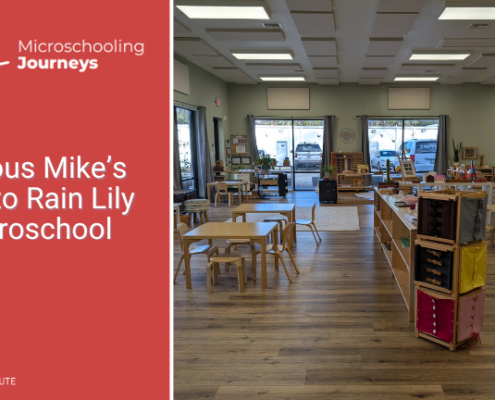
Curious Mike’s Visit to Rain Lily Microschool
In this episode of Microschooling Journeys, Curious Mike visits Rain Lily Microschool in Nassau County, Florida. He visits: Wow. Then he hears the two founders origin story. Kati is a veteran Montessori teacher frustrated with culture and teacher respect issues in her former school, dreaming of a place where all parents felt welcome. Tania trains in Cuba, and then with her husband makes the fraught journey to USA, and ends up working her way up the ladder. Like many, they have a dream of “their own” little school - but how?
Enter Wildflower Network. It’s a network for teacher-led microschools, and they help people just like Kati and Tania: with septic tanks, with website creation, with touchy legal issues, with building a sliding scale tuition model that can tap Florida’s public dollars. This episode is a little different stylistically: it’s Mike’s monologue. Tune in next time for an interview with Matt Kramer, CEO of Wildflower’s 70+ campuses, about expanding these innovative schools nationwide.

Steven Wilson on The Lost Decade: Returning to the Fight for Better Schools in America
In this episode of The Learning Curve, co-hosts U-Arkansas Prof. Albert Cheng and Alisha Searcy interview Steven Wilson, a senior fellow at Pioneer Institute and a leading voice in education reform. Mr. Wilson discusses his journey into K-12 education policy, reflecting on his early work with Gov. Bill Weld and the landmark 1993 Massachusetts Education Reform Act (MERA), which helped propel the state’s schools to national and international success. He explores the intersection of K-12 curricula with race- and class-based politics and discusses themes from his upcoming book, The Lost Decade.
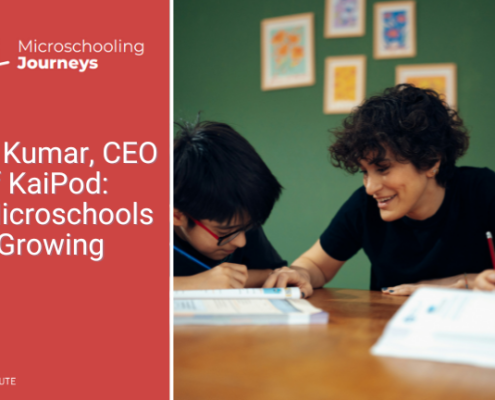
Amar Kumar, CEO of KaiPod: 70 Microschools and Growing
In episode four of Microschooling Journeys, Curious Mike interviews Amar Kumar, the founder and CEO of KaiPod, a network of 70 microschools across the country. They explore what makes KaiPod distinct—whether it’s culture, curriculum, or teacher hiring practices. Amar discusses how he measures and ensures the quality of each school. Next week, Mike heads to Florida to visit Rain Lily Microschool, part of the Wildflower network.

U-Pitt.’s Marcus Rediker on Amistad Slave Rebellion & Black History Month
In this episode of The Learning Curve, co-hosts U-Arkansas Prof. Albert Cheng and Alisha Searcy interview historian Marcus Rediker, Distinguished Professor of Atlantic History at the University of Pittsburgh and author of The Amistad Rebellion. Prof. Rediker explores the 1839 slave revolt aboard the schooner La Amistad. He recounts the leadership of Sengbe Pieh (Joseph Cinqué) and the wider history and human toll of the transatlantic slave trade.
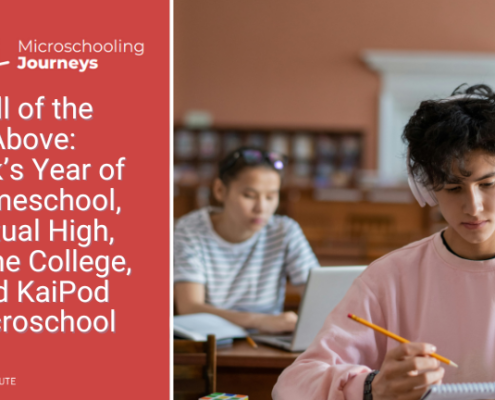
All of the Above: Nick’s Year of Homeschool, Virtual High, Online College, and KaiPod Microschool
In this week's episode of Microschooling Journeys, Curious Mike chats with Nick, a 15-year-old homeschooler dual-enrolled at VLACS and Arizona State University online, pursuing a business degree. Nick shares his unconventional education path, why he left traditional school after kindergarten, and how KaiPod Microschool fits into his journey. Will he return next year? What are his future aspirations? Tune in to find out! Plus, stay tuned for next week’s episode with KaiPod CEO Amar Kumar.

Notre Dame Law Assoc. Dean Nicole Stelle Garnett on Catholic Schools & School Choice
In this episode of The Learning Curve, co-hosts U-Arkansas Prof. Albert Cheng and Alisha Searcy interview Nicole Stelle Garnett, Associate Dean and John P. Murphy Foundation Professor of Law at Notre Dame Law School, and a national expert in education law and school choice. Dean Garnett discusses the vital role Catholic education plays in fostering faith, community, and the pursuit of “the true, the good, and the beautiful.” She explores the challenges posed by the decline of Catholic schools in urban areas, as outlined in her book Lost Classroom, Lost Community: Catholic Schools' Importance in Urban America, and highlights policy solutions such as expanding educational choice options to support Catholic school families.

Alexandra Popoff on Vasily Grossman & Holocaust Remembrance
In this special Holocaust Remembrance Day episode of The Learning Curve, co-hosts U-Arkansas Prof. Albert Cheng and the Heritage Foundation's Jason Bedrick interview Alexandra Popoff, a former Moscow journalist and acclaimed biographer. Ms. Popoff delves into the life and legacy of Vasily Grossman, a 20th-century Jewish Soviet writer and journalist. She explores Grossman's transition from chemical engineering to writing, influenced by his Jewish heritage and the historical context of the time.

Navigating Personalized Learning: Meghan’s Role as a Guide at KaiPod Microschool
In the latest episode of the Microschooling Journeys podcast, Curious Mike interviews Meghan, a dynamic "Guide" at KaiPod Microschool in Nashua, NH. Meghan shares her transition from public school to microschool and how she creates a welcoming, warm environment for her 14 students with individually curated curriculums. Discover Meghan's unique approach to education and stay tuned for more exciting episodes featuring Nick, a 15-year-old KaiPod student, and KaiPod CEO Amar Kumar.

Stanford’s Lerone Martin on the Rev. Dr. Martin Luther King, Jr. & the Civil Rights Movement
In this special MLK Day episode of The Learning Curve, co-hosts Alisha Searcy and U-Arkansas Prof. Albert Cheng interview Prof. Lerone Martin, Martin Luther King, Jr. Centennial Professor at Stanford University and Director of the MLK Research and Education Institute. Dr. Martin offers deep insights into the life and legacy of Dr. King.
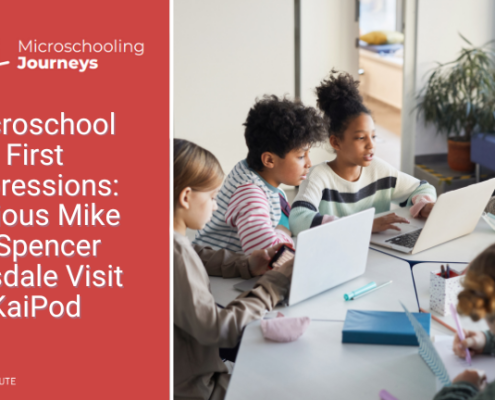
Microschool First Impressions: Curious Mike & Spencer Blasdale Visit KaiPod
In the premiere episode of Microschooling Journeys, Curious Mike joins his friend Spencer Blasdale, a former school leader and former CEO of SchoolWorks, on a road trip to KaiPod Microschool in Nashua, New Hampshire. With years of experience evaluating schools—public, private, and charter—Spencer brings a sharp, seasoned perspective to his first encounter with a microschool. At Kaipod, they observe a unique setup: 14 students guided by two dedicated adults in a personalized, community-driven learning environment. Spencer’s impressions spark key questions: How does this innovative model compare to traditional schools? Would he have considered it for his two daughters? Join us for this engaging exploration of microschooling! Stay tuned for future episodes that deepen the journey: Episode 2 features Meghan, a KaiPod guide; Episode 3 spotlights Nick, a 15-year-old student at KaiPod; and Episode 4 concludes with CEO Amar Kumar, sharing his vision for revolutionizing education through microschools.

ExcelinEd’s Dr. Kymyona Burk on Mississippi, Early Literacy, & Reading Science
This week on The Learning Curve, co-hosts Alisha Searcy and U-Arkansas Prof. Albert Cheng interview Dr. Kymyona Burk, Senior Policy Fellow at ExcelinEd and former state literacy director for Mississippi. Dr. Burk shares insights from her remarkable career in K-12 education reform. She discusses her journey from classroom teacher to leading transformative literacy initiatives in Mississippi that resulted in groundbreaking improvements in early literacy and NAEP reading scores.

Harvard’s Leo Damrosch on Alexis de Tocqueville & Democracy in America
This week on The Learning Curve, co-hosts Alisha Searcy of DFER and U-Arkansas Prof. Albert Cheng interview Leo Damrosch, the Ernest Bernbaum Professor of Literature Emeritus at Harvard University and author of "Tocqueville’s Discovery of America". Prof. Damrosch delves into Alexis de Tocqueville’s historic nine-month journey through the United States in 1831–1832, which inspired his masterpiece, "Democracy in America".

UK’s John Suchet, OBE, on Tchaikovsky, The Nutcracker, & Ballets
This week on The Learning Curve, co-hosts U-Arkansas Prof. Albert Cheng and Dr. Jocelyn Chadwick interview distinguished British television journalist, author, and Classic FM presenter, John Suchet, OBE. Mr. Suchet explores the life and legacy of Pyotr Tchaikovsky, one of Russia's greatest composers. He shares insights into Tchaikovsky’s upbringing, his late start in composing, and the emotional challenges that shaped his career and music.

Tim’s Take: An Education Reform Stalwart Takes a Curious Look at Homeschoolers With ESAs
This week on Homeschooling Journeys, Curious Mike interviews Tim Daly, CEO of Education Navigator and former CEO of TNTP. Mike is hunting for some Big Picture perspective. Intrigued by what he’s seen from ESAs, he chats with old friend Tim. The “old” Education Reform Alliance has died out somewhat; what can this new ESA sector learn?

U-OK’s Dan Hamlin on Emerging School Models & Learning Loss
This week on The Learning Curve, co-hosts Alisha Searcy of DFER and U-Arkansas Prof. Albert Cheng interview Dan Hamlin, an Associate Professor in the Department of Educational Leadership and Policy Studies at the University of Oklahoma. Prof. Hamlin offers his insights on the state of K-12 education policy and reform. He shares how his academic experiences and research shaped his philosophy on education and informed his work with Harvard PEPG’s “Emerging School Models” conference.

NYT #1 Bestseller Dava Sobel on Marie Curie & Women in Science
This week on The Learning Curve, co-hosts Alisha Searcy of DFER and U-Arkansas Prof. Albert Cheng interview Dava Sobel, acclaimed author of The Elements of Marie Curie: How the Glow of Radium Lit a Path for Women in Science. Sobel delves into the life of Marie Curie, the “scientific Joan of Arc,” exploring her extraordinary journey from clandestine education in Tsarist-controlled Poland to becoming the first woman to win two Nobel Prizes in different scientific disciplines.

Becket Fund’s Eric Rassbach on Loffman v. CA DOE, Religious Liberty, & Schooling
This week on The Learning Curve, co-hosts Alisha Searcy of DFER and U-Arkansas Prof. Albert Cheng interview Eric Rassbach, Vice President and Senior Counsel at the Becket Fund for Religious Liberty. Mr. Rassbach discusses the Loffman v. California Department of Education case, where Becket successfully secured a unanimous Ninth Circuit decision ensuring equal access to special education funding for religious school students.

Pioneer Institute Statement on Vocational-Technical School Admissions
Advocates seek to require that admission to vocational-technical…

CUNY’s Carl Rollyson on William Faulkner & Southern Literature
This week on The Learning Curve, co-hosts Alisha Searcy of DFER and U-Arkansas Prof. Albert Cheng interview Carl Rollyson, CUNY professor, and acclaimed biographer of William Faulkner. Prof. Rollyson offers an in-depth exploration of Faulkner’s life, work, and enduring legacy.

NH Gov. Chris Sununu on School Choice
This week on The Learning Curve, co-hosts Alisha Searcy of DFER and U-Arkansas Prof. Albert Cheng interview New Hampshire Governor Christopher Sununu. Gov. Sununu discusses his upbringing in a well-known political family and how the influence of his father, a former governor and White House chief of staff, and his brother, a former U.S. senator, has shaped his public service.

Statement of Pioneer Institute on MCAS Ballot Failure and State of Education in Massachusetts
Yesterday was a bad day for public school students in Massachusetts…

Jeffrey Meyers on Edgar Allan Poe, Gothic Horror, & Halloween
This week on The Learning Curve, co-hosts Alisha Searcy of DFER and Dr. Jocelyn Chadwick interview Jeffrey Meyers, acclaimed literary biographer, about his comprehensive exploration of Edgar Allan Poe’s life and work.
